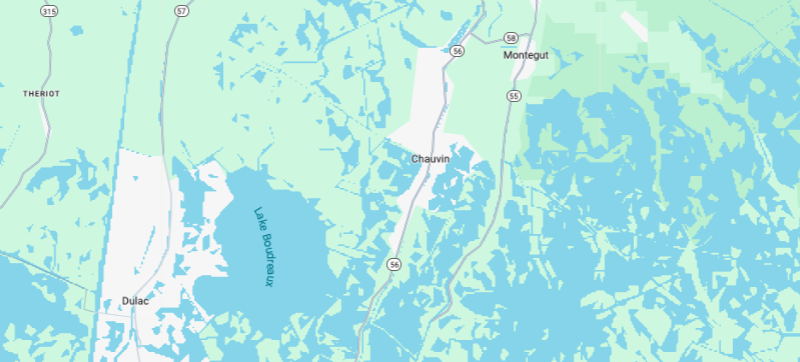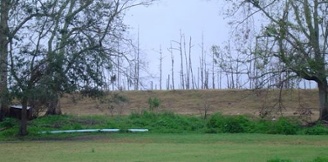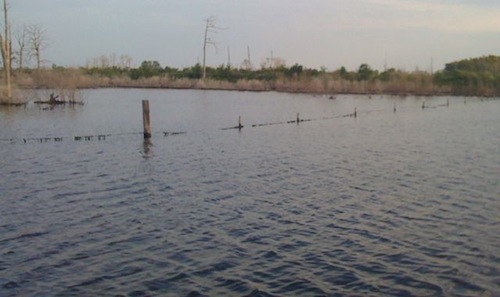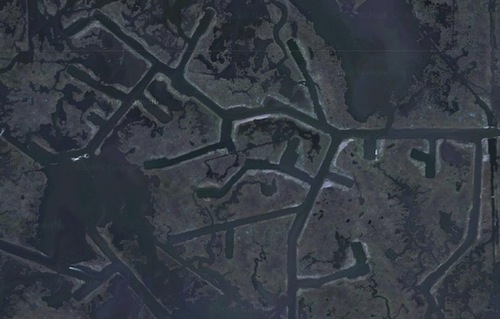The REAL Tragedy of the Oil Industry in Louisiana

I was born and raised in the oil patch, getting my start in Houston and then moving to south Louisiana when I was 10 years old. Spending as much time as possible fishing, hunting, trawling, and hanging out in the marsh and on the water was the best part of my life in south Louisiana. I paddled pirogues all over the bayous and loved it.
Bayou country comprises narrow strips of land along the bayous used by trawlers to travel between their homes and the lakes, bays, or Gulf of Mexico, where they trawl for shrimp. Not many Cajuns trawl anymore, though. In the satellite image above, you can see Bayou Petit Caillou, along which Chauvin sits and highway 56 runs. I lived there from 1971 to 1979. If you go a little further down, you run into the end of the road at Cocodrie.
La st year I visited Chauvin for the first time in over two decades and found that things have changed quite a bit. The photo here shows that all of the trees have died on the other side of the levee on the back bayou. That’s because the water back there, which used to be mostly fresh water, is now salty. Where I used to fish for bass and perch, my friends now catch redfish.
st year I visited Chauvin for the first time in over two decades and found that things have changed quite a bit. The photo here shows that all of the trees have died on the other side of the levee on the back bayou. That’s because the water back there, which used to be mostly fresh water, is now salty. Where I used to fish for bass and perch, my friends now catch redfish.
The levee, by the way, was built to keep the water from flooding the narrow strip of land along the front bayou where everyone lived. Along with the levee, there were pumping stations, like the one shown below. These pumps were close to the house I lived in my last four years in Chauvin, and I spent a lot of time back there. What you see as mostly open water now, though, was mostly marsh with little strips of land here and there. Yes, there are still little bits left, but it’s nothing like it was in the ’70s.

You can see another illustration of how high the water has risen in the photo below, taken last year when my friend Dean and I went fishing (for redfish, not bass) near my first house in Chauvin, when we lived ‘down the bayou.’ See that fence? That used to surround a cow pasture. As the water kept rising, lower areas like these got flooded and they had to move the levee forward, surrendering formerly good land to the water.

I’ve got more pictures, too, showing, for example, how Lake Boudreaux is now much bigger than it used to be and practically lapping up on the road to Cocodrie. It looks like the community of Petit Caillou, named for the front bayou, may be gone within decades.
Why is this happening? A few years ago I picked up the book Bayou Farewell by Mike Tidwell. In his research on the rising water and saltwater intrusion in south Louisiana, he visited Bayou Petit Caillou and a couple of others. In the end, he blamed the levees on the Mississippi River and the canals cut through the marshes by the oil industry. The levees prevented the Mississippi from replenishing the marsh with its abundant silt. The canals allowed the Gulf to chip away at the marsh and carry it out to sea.
Take a good look at the photo below, a satellite image of one small area east of Bayou Petit Caillou. Those aren’t streets and cul-de-sacs you’re looking at. They’re canals, hacked into the marsh by the oil industry, seeking access to the rich deposits of oil and gas in the area. Is it any wonder the whole area is melting into the Gulf?! (If you want to see this yourself, go to Google maps and type in Chauvin, LA, switch to satellite images, and scroll around. There’s plenty of it there.)

As I said, I spent a lot of time in boats when I lived there in the ’70s. At ground level, we didn’t see these canals as a problem. Instead they meant that we could get into a lot more areas to go fishing and hunting, thanks to the oil industry. Now we know that the long-term implication of such canals is the destruction of the wetlands.
So, about that BP oil spill, yeah, it’s a huge problem. A disaster. At the same time, the oil industry has enriched south Louisiana. My step-father was a tool pusher for Penrod Oil Company. I have a nephew and a cousin who work offshore. We all use the products of the oil industry every day, and we’re not getting off the stuff anytime soon.
But let’s look at the whole picture and see that the oil industry has been destroying south Louisiana for a long time. That, in my opinion, is the real tragedy.
Allison A. Bailes III, PhD is a speaker, writer, building science consultant, and the founder of Energy Vanguard in Decatur, Georgia. He has a doctorate in physics and is the author of a bestselling book on building science. He also writes the Energy Vanguard Blog. For more updates, you can subscribe to Energy Vanguard’s weekly newsletter and follow him on LinkedIn.
Related Articles
Cajuns, Living Down the Bayou, and Peak Oil
Lloyd Alter Is Living the 1.5 Degree Lifestyle
Comments are closed.
This Post Has 7 Comments
Comments are closed.

Good article Allison.&
Good article Allison.
It is hard to think about the spill going on in the Gulf without getting sick to my stomach, but I really don’t like this ‘vilification’ of the industry. Each and everyone of us are reliant upon this ‘crude’ type of energy.
Now is the best time to forge ahead with renewable options, but they are not the end-all, be-all of our energy problems. We all have the responsibility to conserve how we use energy and we can all easily take steps at home to begin changing our habits.
The one thing I am scared of is a ‘3-mile Island’ type scenario where we don’t drill. With decrease supply and ever increasing increasing demand, prices will rise and crimp the pockets of everyone. Unfortunately, that may be what we need to wake up. The run up of 2008 was too short lived to create change. The next run up will not be the same.
The bigger picture that you are talking about is also important. For those that think our impacts are minimal on this earth, we need to realize that not only houses work as a system, that the earth works as a system as well.
Best,
Jamie Kaye
Thanks, Jamie. The Earth is
Thanks, Jamie. The Earth is indeed a system – an enormous and complex system with a great number of interconnected and interdependent parts, of which humans are one.
I heard something interesting recently about the impact of humans on the Earth. I can’t remember where now, but the speaker said that if insects suddenly disappeared from the planet, all life forms on Earth would be devastated. If humans disappeared, most other species would flourish. It’s hard to know if it’s really true or not, but I suspect that it’s pretty close.
Allison,
Allison,
That was your friend Sir Ken that said that about the impact of humans disappearing from the earth! True or not, though, we’re probably not going anywhere anytime soon.
I think the key is in educating humans about their impact. Especially the folks that Jamie mentioned who downplay it. As building science professionals, we work to raise the awareness before these tragedies do. Even though many times that is what it takes for it to sink in.
Nicely written.
Nicely written.
I get frustrated by the shortsightedness of our society. To much I see finger pointing and petty greed influencing behavior and thoughts. Bp didn’t create this problem, we did. Soilent Green is people! We need to increase taxes in fuel to decrease demand and motivate conservation. Everything else is a placeebo.
I thought it was in Ken
I thought it was in Ken Robinson’s video, Chris, but I didn’t remember if it was the one I posted here in the blog or the one from this year.
Ted, I get frustrated, too. Every person pointing their finger at BP who’s not doing what they can to cut their energy use is a hypocrite. Also, it’s so much easier to focus on these acute problems, like a spill, than the chronic problems, like the destruction of the wetlands that I’ve written about here.
It’s like the frog and the pot of boiling water. Put it in with the water already boiling, and it jumps out. Put into tepid water and bring it to a boil gradually, and it’ll stay there till it’s cooked. (In Chauvin, though, we always fried frog legs, and they were dead before we put them in the pan.)
Excellent article Allison.
Excellent article Allison. Per CNN last night, BP is really not telling the truth about the amount of oil spilling out of this gusher. Also the containment really never worked. In fact by cutting off the broken pipe, the rate of flow has increased by 20%. In reality the amount of oil spewing out is 13% more now than when the accident occurred.It is sad to see all the aquatic creatures dying because of our greed and unending need for oil.
Jay, yes, this oil spill is
Jay, yes, this oil spill is definitely a disaster. The amount of oil gushing into the Gulf is huge and will have a long-term impact on a lot of ecosystems.
Ricky, thanks for your comment and for posting this article in your Facebook group.